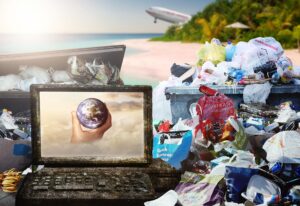Separating fact from fiction is crucial for forming realistic expectations and making informed decisions about recycling. Several myths surround recycling, clouding public perceptions and sometimes discouraging people from participating in eco-friendly practices. Misinformation can be detrimental to the sustainability movement, which relies on collective action to make a meaningful impact. Here, we debunk some of the most persistent recycling myths, utilizing current research and data to clarify and educate.
One widespread myth is that all plastic can be recycled. In reality, only certain types of plastic are recyclable through municipal programs. Plastics are classified by resin codes, ranging from #1 to #7. Generally, #1 (PETE) and #2 (HDPE) are widely accepted by recycling programs. Other types, such as #3 (PVC), #4 (LDPE), #5 (PP), #6 (PS), and #7 (Other), are less frequently recycled due to economic and technical challenges. This misconception may lead people to “wish-cycle,” placing non-recyclable materials into recycling bins, which ultimately contaminates the recycling stream and increases processing costs.
Another myth is that recycling uses more energy than it saves. This claim stems from misunderstandings about the recycling process. In fact, recycling typically conserves energy compared to using virgin materials. For example, recycling aluminum can save up to 95% of the energy required to produce the same amount from its raw form. Similarly, recycling paper uses about 60% less energy than creating new paper from trees. The energy savings associated with recycling can significantly reduce greenhouse gas emissions, a critical factor in combating climate change.
A prevalent myth suggests that recyclables are simply sent to landfills. While it is true that some collected recyclables may end up in landfills due to contamination or lack of market demand, the notion that all recyclables are discarded is false. Recycling facilities work diligently to sort, clean, and process materials for resale to manufacturers. Market demand for recycled materials fluctuates, but ongoing advancements in technology and growing commitments to sustainability from corporations drive demand for recyclable materials.
Some believe recycling does not make a significant environmental impact. This myth undermines the collective benefits of proper recycling practices. Recycling has clear environmental benefits, including reducing the need for raw materials, lowering energy consumption, and cutting greenhouse gas emissions. For instance, recycling one ton of paper can save 17 mature trees, 7,000 gallons of water, and 4,100 kWh of electricity. These resource savings illustrate how small actions, when performed collectively, offer substantial environmental returns.
Another common misconception is that glass and metal can be recycled indefinitely without degradation, while paper and plastic cannot be recycled as many times. While it’s true that glass and metals do not degrade in quality regardless of how often they are recycled, other materials have varying recyclability lives. For example, paper can typically be recycled five to seven times before the fibers become too short to hold together. Plastic undergoes a reduction in integrity with each cycle and is often downcycled into products such as composite lumber. Hence, understanding the limitations of each material helps manage expectations about recycling.
There is a false belief that biodegradable materials do not need to be recycled. Though biodegradability is a beneficial trait, biodegradable materials placed in landfills decompose anaerobically, producing methane, a potent greenhouse gas. Recycling biodegradable materials or composting where facilities exist is a more sustainable approach, reducing methane emissions and returning valuable nutrients to the soil.
The idea that recycling is too costly for local governments and offers no economic benefit is another myth needing debunking. Although the initial investment in recycling infrastructure can be significant, the long-term economic benefits are substantial. Recycling creates jobs—more than landfill or incineration processes—and generates significant economic activity in the materials recovery industry. According to a study by the Environmental Protection Agency, recycling and reuse activities in the United States accounted for 681,000 jobs, $37.8 billion in wages, and $5.5 billion in tax revenues in a single year. Hence, the notion that recycling lacks economic benefit overlooks its broad contributions to the economy.
Some believe recycling is inconvenient and time-consuming. However, many communities offer single-stream recycling, where all recyclables go into one bin, simplifying the process for consumers. Despite the convenience, proper sorting can boost efficiency and material recovery rates, benefiting the recycling ecosystem. Education on what can be recycled and how to prepare items, such as rinsing containers and removing caps, empowers individuals to participate effectively.
Many people inaccurately assume that products labeled “recyclable” are always accepted in curbside programs. The term “recyclable” indicates that a product can potentially be recycled but not necessarily in all local programs. Variations in municipal guidelines necessitate a careful review of local recycling rules to ensure proper disposal. Educating oneself on these guidelines helps confirm that materials are correctly recycled, minimizing contamination.
The misconception that individual recycling efforts are insignificant can deter participation. However, small individual actions add up to massive collective change. Everyday recycling across a large population can drastically reduce landfill waste, conserve resources, and protect the environment. To foster greater participation, communities can promote recycling’s impacts through campaigns and education programs, highlighting stories of successful recycling initiatives and their outcomes.
Debunking these myths is essential to advance the understanding and efficacy of recycling practices. Accurate information empowers individuals, businesses, and governments to contribute effectively to sustainability efforts. By recognizing the economic, environmental, and societal benefits of recycling, we can move towards a more sustainable future, leveraging the power of informed collective action.



